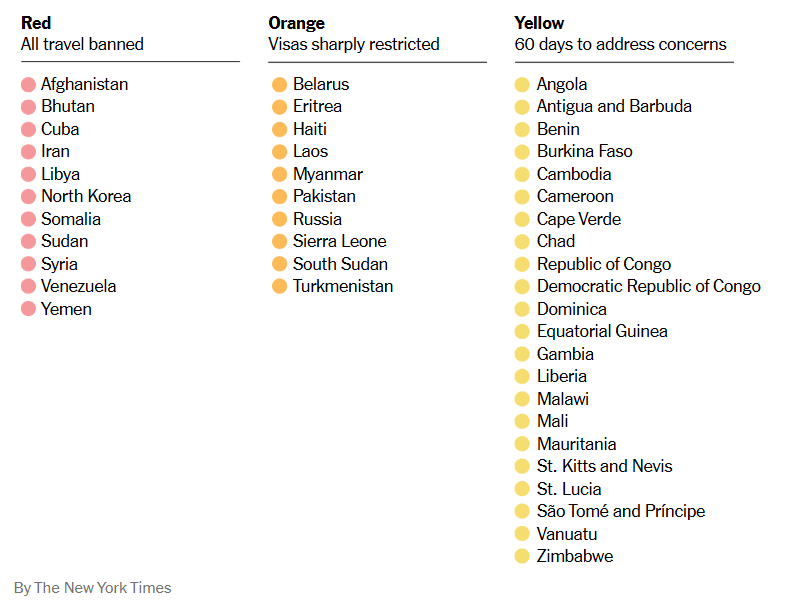
The landscape of U.S. immigration policy has undergone significant changes in recent months, affecting various groups and communities. This blog post will delve into ongoing changes employers should be aware of for potential changes to their Form I-9 compliance requirements. Recent news includes the reduction of Temporary Protected Status (TPS) for Haiti, the termination of TPS for Venezuela, broader shifts in immigration enforcement, including increased ICE activities and state-level legislation, and new registration requirements for noncitizens.
Update from June 10, 2025
Immigration Status Extensions and Updates as of June 2025
| Prior Expiration | New Expiration | |
| H1B Auto-extension (with/without Optional Practical Training (OPT)) | Oct 1, 2025 | April 1, 2026 |
| Temporary Protected Status (TPS) | ||
| Sudan | May 3, 2025 | Nov 3, 2025 |
| Venezuela | April 7, 2025 | April 3, 2026 (stay order) |
| Ukraine | April 20, 2025 | October 19, 2026 |
| Haiti | February 3, 2026 | August 3, 2025 |
| Afghanistan | May 20, 2025 | July 14, 2025 |
| Cameroon | June 7, 2025 | Aug 4, 2025 |
| Nepal | – | Aug 5, 2025 |
| Deferred Enforced Departure (DED) Hong Kong | Feb 5, 2025 | Feb 5, 2027 |
| CHNV (Cuba, Haiti, Nicaragua, andVenezuela)parole programs | April 24, 2025 | Stay order 2021 TPS Designation Unaffected (for Now)and keep their status through September 10, 2025. However, no further extensions are expected after that date. 2023 TPS Designation:Their current status and employment eligibility remain valid for now. As of 5/30/2025, UPDATE:A U.S. District Judgein San Francisco ruled that an estimated 5,000 of 350,000 Venezuelans whose TPS was extended to October 2026 are not affected by the Supreme Court’s order and are not eligible for deportation. |
Potential Elimination of the USCIS Ombudsman’s Office
Updates from March 25, 2025
The USCIS Ombudsman’s Office, which served as a liaison between the public and the immigration service, is being eliminated as part of broader cuts to various oversight divisions within the Department of Homeland Security (DHS). This office provided an avenue for applicants and employers to flag systemic agency errors, delays, and special circumstances. Its elimination could lead to increased challenges for employers and applicants alike because it would no longer be a resource for addressing these issues.
Potential Reinstatement of Travel Restrictions
President Trump’s administration is reportedly planning to reinstate and expand travel bans targeting more than 43 countries.

These restrictions could have several implications for employers:
- Talent Shortages: Travel bans may hinder the recruitment of skilled workers from affected countries, creating talent shortages in key industries.
- Re-Entry Issues: Employees traveling internationally for work may face re-entry issues, delaying projects and affecting business operations.
- Increased Verification Efforts: Employers might feel compelled to increase verification efforts for employees from targeted countries, potentially leading to privacy concerns or unintentional discrimination in I-9 processes.
Impact of IRS-ICE Data Sharing on Employers and I-9 Compliance
A potential agreement between the IRS and ICE to share addresses of suspected undocumented immigrants could significantly impact employers, especially regarding I-9 compliance and hiring processes.
Implications for Employers
- Increased Scrutiny and Audits: Due to enhanced ICE access to detailed information, employers may face more frequent inspections of I-9 forms and employment records.
- Privacy Concerns: Sharing taxpayer information with ICE raises privacy issues for both employers and employees, necessitating strict compliance with privacy laws.
- Legal and Compliance Challenges: Employers must maintain accurate I-9 documentation to avoid penaltiesand conduct regular internal audits to ensure compliance.
- Employee Relations: Increased enforcement actions may cause anxiety among employees, particularly those with undocumented status or family members. Employers should provide support and address concerns.
Impact of Social Media Activity Targeting on Employers
The Trump administration’s recent immigration policies includes monitoring the social media activity of visa and green card applicants. This policy shift could have implications for employers, particularly regarding I-9 compliance and hiring practices.
Implications for Employers
- Increased Scrutiny: Employers may face heightened scrutiny as immigration authorities use social media to verify the authenticity of applicants’ information. This could lead to more frequent audits and inspections of I-9 forms and employment records.
- Privacy Concerns: Monitoring social media activity raises privacy issues for both employers and employees. Employers must ensure their data handling practices comply with privacy laws to avoid potential legal challenges.
Updates from March 14, 2025
ICE and Immigration Enforcement
ICE Staffing and Enforcement
ICE faces challenges with stagnant staffing levels despite rising demands. To address this, the Trump administration has authorized other federal agencies, such as the U.S. Marshals Service and DEA, to assist in immigration enforcement by granting them immigration officer powers. This aims to support ICE’s efforts in apprehending individuals suspected of being in the U.S. without authorization.
Increased Enforcement Activities
Recent data shows a significant increase in ICE arrests during the first 50 days of the Trump administration’s second term, with the daily arrest rate more than doubling compared to the previous administration. This heightened enforcement activity may be part of a broader strategy to increase removals and deter unauthorized immigration.
State-Level Immigration Enforcement: Tennessee’s New Legislation
Tennessee has enacted a new law to bolster immigration enforcement within the state. Key provisions include:
- Centralized Immigration Enforcement Division:A new division will collaborate with federal authorities to implement immigration policies effectively.
- Distinct Driver’s Licenses:A system has been introduced that differentiates U.S. citizens from legal permanent residents.
- Sanctuary City Policies:Local officials face felony charges for adopting or maintaining sanctuary city policies.
- Grants for Local Governments:Grants are allocated to support local governments in enforcing federal immigration regulations.
This legislation marks a significant shift in Tennessee’s approach to immigration enforcement and is expected to face legal challenges regarding its constitutionality.
Department of Justice (DOJ) Policy Shift
The DOJ has announced a significant policy shift to prioritize immigration enforcement by expanding the use of all available criminal statutes to address illegal immigration. This includes increased scrutiny of I-9 compliance, with potential criminal charges for employers engaging in unlawful employment practices or document fraud.
Key Points of the DOJ Policy:
- Criminal Statutes:The DOJ will prosecute immigration-related offenses using all available criminal statutes, not just immigration laws.
- Worksite Enforcement:Expect increased worksite visits and I-9 audits, with higher penalties for non-compliance.
- Employer Liability:Employers may face criminal charges for harboring undocumented individuals or engaging in unlawful employment practices.
New Registration Requirements for Noncitizens
On February 25, 2025, USCIS announced a registration and fingerprinting requirement for noncitizens in the U.S. This requirement applies to all noncitizens aged 14 or older who were not previously registered and will be staying in the U.S. for 30 days or more. Noncitizens must create a USCIS online account to prepare for the registration process, which is set to become effective on April 11, 2025.
Social Media Monitoring for Immigration Applicants
The Trump administration has proposed requiring immigrants applying for various benefits, including green cards and citizenship, to disclose their social media information. This policy aims to enhance vetting and screening processes to ensure national security and public safety. The proposal applies to nine key immigration forms and is open for public comment until May 5, 2025.
Trump Administration’s Self-Deportation App
The Trump administration has introduced the CBP Home app, repurposing its original function of aiding asylum appointments now to assist undocumented migrants present in the U.S. in self-deportation. This innovative app enables individuals to express their willingness to depart voluntarily, offering a chance to evade potential arrest and detention. Failure to utilize this option could result in deportation and a lasting prohibition from reentering the country.
Marco Rubio’s Determination on Immigration and Border Regulations
Secretary of State Marco Rubio has made a significant determination that could alter how immigration and border regulations are implemented in the U.S. He declared that all federal efforts to control the entry and exit of people, as well as the movement of goods, services, data, and technology across U.S. borders, are considered “foreign affairs functions” under the Administrative Procedure Act (APA). This classification exempts these regulations from the APA’s notice-and-comment requirements.
Key Points:
- Border Security Focus:The decision is driven by the need to secure America’s borders and protect citizens from external threats such as narcotics trafficking, human smuggling, and unchecked migration.
- Interagency Coordination:Rubio emphasized the need for a coordinated response across federal agencies, including State, Defense, Homeland Security, and Justice.
- Executive Order Alignment:The move aligns with President Trump’s Executive Order 14150, prioritizing national interests in foreign policy.
- Transparency Concerns:Critics argue that bypassing notice-and-comment procedures could reduce transparency and public participation in policymaking.
This development marks a significant shift in immigration policy, raising both security and transparency concerns.
Enforcement Trends
The recent changes in U.S. immigration policy reflect a broader trend towards increased enforcement and stricter regulations. The reduction of TPS for Haiti, termination of TPS for Venezuela, and potential revocation of protections for Ukrainians highlight the precarious nature of temporary immigration statuses. Meanwhile, ICE’s expanded enforcement efforts and state-level legislation, such as Tennessee’s new law, underscore the growing role of both federal and state authorities in immigration enforcement. The introduction of new registration requirements and social media monitoring for immigration applicants further emphasizes the administration’s focus on enhanced vetting and security measures and controversial announcement by Secretary of State Marco Rubio’s determination to classify immigration and border regulations as foreign affairs functions under the APA marks a significant shift in U.S. policy, balancing enhanced security with concerns over transparency and public input.
As these policies continue to evolve, it is crucial for affected communities, employers, and legal practitioners to stay informed and adapt to the changing landscape of U.S. immigration law. The coming months will likely see further developments and potential legal challenges to these policies, which could have a significant impact at both national and local levels.
Future Implications
The future of U.S. immigration policy remains uncertain, with ongoing debates over border security, deportation policies, and the role of social media in vetting applicants. As the Trump administration continues to implement its immigration agenda, monitoring these developments closely and considering their implications for individuals and communities affected by these changes is essential.
Recommendations for Affected Groups
- TPS Beneficiaries:Ukranians, Haitians, and Venezuelans should closely monitor updates regarding their TPS status and explore alternative immigration options if available.
- Employers:Conduct regular internal audits to ensure I-9 compliance and prepare for increased worksite enforcement.
- Immigration Applicants:Be prepared to disclose social media information as part of the application process and ensure that information provided on online profiles aligns with that provided on immigration forms.
- Noncitizens:Register with USCIS if required and maintain accurate records to avoid potential legal issues.
By staying informed and proactive, individuals and organizations can navigate these complex changes more effectively and prepare for future developments in U.S. immigration policy.